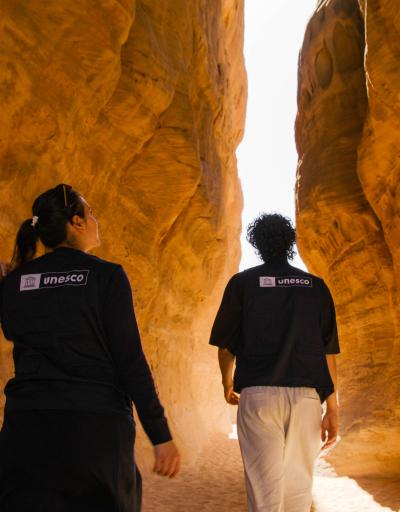About the project
Preserving and Raising Awareness of Documentary Heritage in AlUla and Saudi Arabia
Established in 1992 amidst growing awareness of the parlous state of preservation and accessibility of documentary heritage across the world, UNESCO’s Memory of the World (MoW) Programme has been pivotal for the preservation of documentary heritage of world significance and outstanding universal value, whose record may have otherwise perished.
The programme facilitates the preservation of sites, manuscripts, collections and memories that form our cultural heritage and inform the understanding of our common humanity.
Within Saudi Arabia, AlUla’s Hegra Archaeological Site (al-Hijr / Mada’in Salih) is the first World Heritage property to be inscribed in the country. Recognized as a site of outstanding universal value, Hegra is the largest conserved site of the ancient Nabataean civilization south of Jordan’s Petra. It features remarkably well-preserved monumental tombs from the first century BC, as well as structures demonstrating hydraulic expertise in the form of water wells that are still used today.
Jabal Ikmah, Abu Ud, Al-Aqra’a and other regions within AlUla feature rich and unique mountain inscriptions that trace back the origins of the Arabic language and the use of the Arabic alphabet, which has been pivotal in shaping Saudi Arabian and Arab cultures.
"Our joint participation in the MoW Programme sets the best standards as part of the outstanding cooperation between the Royal Commission for AlUla and UNESCO, as well as the Kingdoms Institute’s commitment to the preservation of the most fragile values of our cultural inheritance."

“This partnership will connect AlUla's past, present and future by harnessing the power of education, science and culture to act as a catalyst for sustainable development model and long-lasting change.”

Enabled by financial support from the Royal Commission for AlUla (RCU), UNESCO’s MoW Programme is leading efforts to preserve documentary heritage at AlUla and actualize its potential as a resource for intercultural dialogue and global citizenship education.
The project aims to enhance the visibility of and accessibility to Saudi Arabian documentary heritage, as well as to strengthen the capacity of local and regional archives, libraries, museums and other memory institutions to effectively identify, preserve and enable access to heritage in AlUla, Saudi Arabia, and the Arab region more broadly.
In AlUla Old Town, a collective ethos of neighborly alliance was built into the very fabric of homes, whose side-by-side attachment with one another helped fortify the city for its early inhabitants. Reflecting this spirit and structure, UNESCO’s MoW Programme works with its partners to preserve the world’s outstanding documentary heritage, safeguarding it against decay or disregard.

MoW Programme
How does the MoW Programme preserve, protect, and make the world's documentary heritage accessible for all?
1. Facilitating preservation
Direct practical assistance or dissemination of advice, information and training, as well as connecting sponsors with timely and appropriate projects particularly in areas affected by conflict or natural disaster.
2. Universal access
Encouraging publication and distribution of digitized products to be accessed in a wide-reaching and equitable manner, while respecting cultural sensitivities and upholding indigenous communities' custodianship and guardianship of documentary heritage material.
3. Increasing awareness
Developing MoW Registers to enhance and promote public awareness of the existence and significance of documentary heritage.



